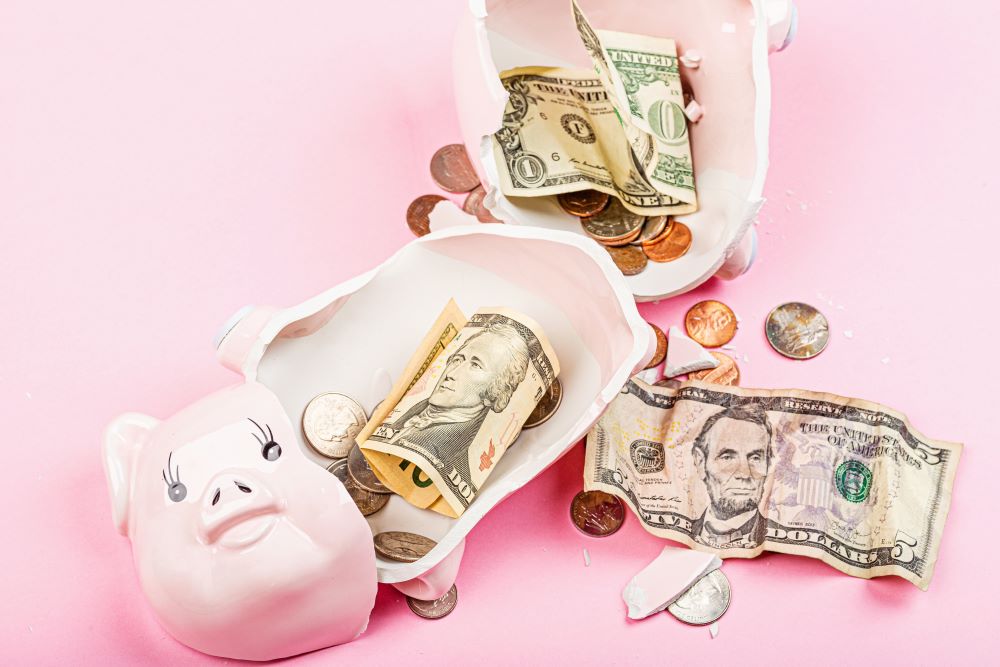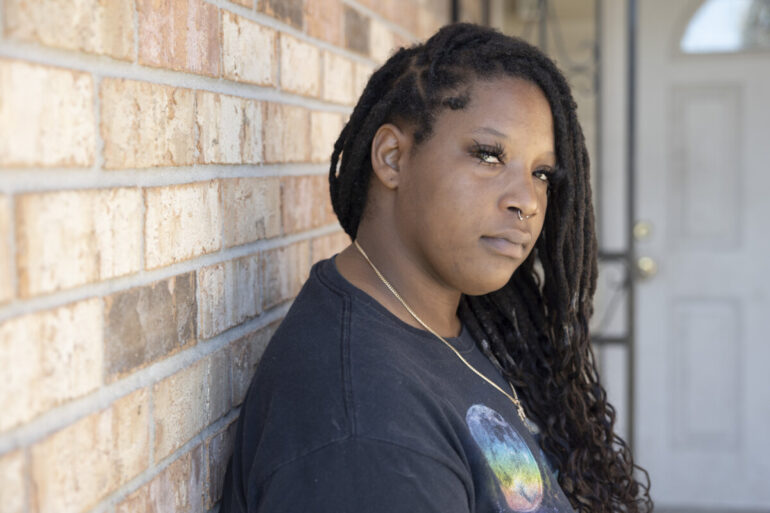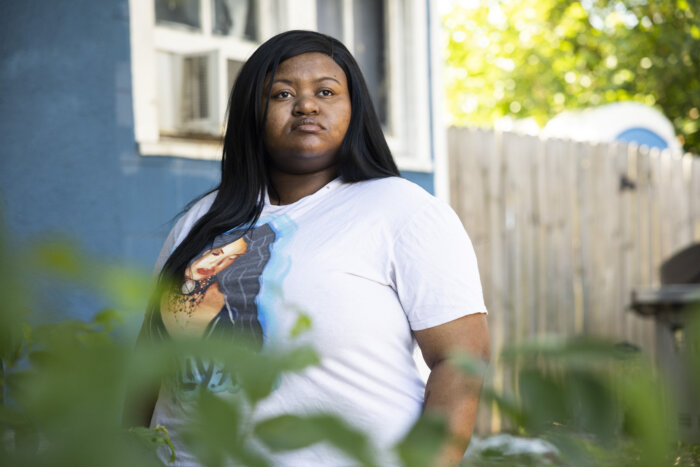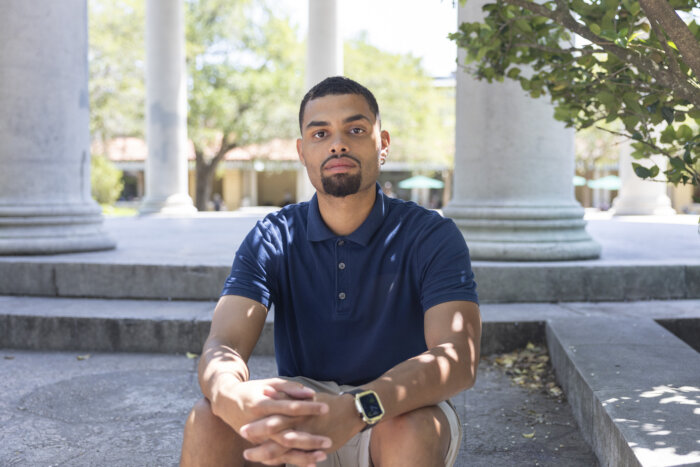-
play_arrow
WURD Radio
Tale of two cities: What Philadelphia can learn from New Orleans’ guaranteed income pilot


WURD is one of more than 20 news organizations producing Broke in Philly, a collaborative reporting project on solutions to poverty and the city’s push towards economic mobility. Follow us at @BrokeInPhilly. Our Kids is a project of the Broke in Philly reporting collaborative examining the challenges and opportunities facing Philadelphia’s foster care system. Steve Volk is an investigative solutions reporter with Resolve Philly.
By Jack Tomczuk | Metro Philadelphia

Christiana Botic for Resolve Philly
Antonique Slaughter did not feel safe, working a 12-hour shift – 9 p.m. to 9 a.m. – at a gas station in a dangerous neighborhood.
But she had to make ends meet. After her mother, Raneka, was killed in a crash with a dump truck, Slaughter, at age 20, became the primary caregiver for her three younger siblings.
“That was a crazy step to take because it’s like that was everybody’s only parent,” said Slaughter, who lives in New Orleans’s 9th Ward.
She dropped out from an online college program. Virtual classes weren’t for her, but Slaughter remained in touch with a school counselor, who provided her with an application for a guaranteed income pilot program.
For a period of 10 months, Slaughter and 124 other young people between the ages of 16 and 24 received $350 a month. Participants were not required to work or apply for jobs, and the money could be used for anything.
“It definitely helped me when the gap was not being met,” Slaughter, now 21, said. “I feel like everybody should get it honestly. For a time in your life, every young person, you just need a little money to be your cushion.”
Dozens of guaranteed income trials are being held around the country—some pilots are targeted to a specific group, while others provide unconditional cash to all residents of a particular area.
In Philadelphia, guaranteed income pilots providing money to pregnant women, oncology patients, families receiving federal cash assistance and those on public housing wait lists are ongoing or in the works.
The New Orleans Guaranteed Income Program, which ended in January, focused on “opportunity youth” – young people disconnected from work and school. The median household income for participants was $15,700.

A similar group, and age range, has been the target of many of Philadelphia’s anti-violence interventions. Both cities have experienced stubbornly high rates of violent crime and poverty, with the added threat of possible environmental destruction for New Orleans —though climate-related issues appear to be on the rise in Philadelphia.
“Due to the pandemic, we had a lot of young people in that age group who really became disconnected from positive social supports, so that was sort of the impetus for this,” said Jack Shaevitz, the former deputy director of policy in the New Orleans Mayor’s Office who oversaw the initiative.
Though other cities and counties have given out more than $350, Shaveitz said municipal officials took into consideration the value of the since-expired federal child tax credit, as well as the oft-quoted statistic that a significant share of Americans cannot afford a $400 emergency expense. Funding for the pilot was also limited.
Participants described the process as fairly simple. They received a card, through which the money was uploaded every 30 days.
At first, the offer reeked of a scam, said Sarah Washington, a 20-year-old Waffle House employee who lives in the Algiers neighborhood, on the other side of the Mississippi River from the rest of New Orleans.
“It didn’t rub me right because honestly I never heard of anything about it or like it before, so I was kind of skeptical,” she said. “When I got the card, that’s when I knew it was real.”
“It helped a lot,” Washington added. “There was a period where I wasn’t really working, and the money did come in handy.”
Instead of an open application process, the mayor’s office relied on 10 partners, including schools and nonprofits serving youth, to refer people to the pilot.
Educators for Quality Alternatives, which operates the city’s alternative schools, enrolled 15 young people in the trial. EQA’s schools serve students expelled from traditional public schools; students with children of their own; and those who have fallen far behind in class.
“The violent crime here in the city really impacts a lot of our students, whether they have been victims themselves, whether they have family members who have been victims,” said Ja’Mecia Fall, the organization’s culture dean and next steps coach.
Attendance went up among the students who received the payments, though the sample size was small.
“From what we saw, it just took a little bit of some of the stress off and made being a student a little bit easier to balance,” EQA CEO Elizabeth Ostberg said.
Guaranteed income participants received benefits counseling from the United Way of Southeast Louisiana. They were told about the risk that the temporary payments could take a young person over the income threshold for programs such as Medicaid and SNAP, also known as food stamps.
Tiffany Scott, a United Way manager of financial capability, said the city provided a waiver for Section 8 voucher holders classifying the income as gifted aid. But not all benefits distinguished between the payments and regular income.
“It’s something that’s new, and so I think the main concern is, ‘Hey, is this gonna affect something that I’m used to constantly receiving on a monthly basis?’” Scott told Metro.
Recipients and a control group, who did not get the $350 a month, were tasked with taking periodic quizzes in exchange for gift cards. There is also an in-depth interview process, said Stacia West, a professor at the University of Tennessee.
West is co-founder and director of the Center for Guaranteed Income Research, which is housed at the University of Pennsylvania and is evaluating the New Orleans program and a host of other pilots.
“Within the center, one of our main goals is to create this sort of large dataset across the country that uses common instrumentation,” West said.
She and other researchers measure income volatility — month-by-month increases and decreases in income — and they look at health outcomes, financial stress and other factors.
A peer-reviewed study of a guaranteed income program in Stockton, California, found that the payments led to a decrease in volatility and improved mental and physical health. The Stockton experiment, which provided $500 a month to 125 people for two years, was “the spark that lit the flame for all of these studies to roll out across the country,” West said.

While a full evaluation of the New Orleans program is not expected until next spring, preliminary data has been released showing how the recipients spent their money.
Nearly 50% of the money was spent on food and groceries, according to information posted to the Guaranteed Income Pilots Dashboard. Retail sales accounted for 31%; transportation 8%; and housing and utilities 4%.
“There’s nothing terribly salacious about how people spend their money,” West said. “But it also speaks to and kind of counters this pretty toxic narrative that lower income people, and especially young people or people of color, cannot be trusted with unconditional cash.”
The early findings match how Ramon Jones, 25, of Metairie, said he used the money. “I went grocery shopping, honestly,” he told Metro. “Grocery and auto gas, to tell you the truth.”
Jones, who lives with his brother and is working on his GED, recounted that he was contacted about the pilot after his application for food stamps was denied.
Though he has held a variety of jobs, Jones has a passion for cars and taught himself how to detail vehicles by watching YouTube videos. He drives a van packed with all the cleaning equipment he has acquired over the years – vacuums, scrubbers, extractors, water tanks.
In 2020, he created Ramon Auto Detailing as a limited liability company, and the money helped him concentrate on growing his business.
“It’s challenging,” Jones said. “You have to learn how to market yourself. You need to get the right clientele because people will try to beat you down.”
And while the payments have stopped, he believes he is in a better financial position now than prior to his involvement in the program.
“You got to adjust,” Jones added. “You can’t cry about it, and you know it ain’t going to last forever. They told you that.”
THE WURD WEEKLY NEWSLETTER
Black Talk Media sent straight to your inbox.
BECOME A MEMBER
The forWURD Movement is your way to
protect and preserve Independent Black Media.
Written by: Associated Contributor
Antonique Slaughter Broke In Philly income Louisiana New Orleans pennsylvania philadelphia philly Ramon Jones Sarah Washington
Similar posts
Featured post
Latest posts

Teens Cultivate Soil and Safety at Sankofa Community Farm

This week on WURD: Musiq Souldchild shares his journey, PA’s budget delays, Sherri Shepherd’s latest role

This week on WURD: Philly teachers on strike, SEPTA’s funding issues, Sankofa through farming

This week on WURD: I.C.E. in Los Angeles, “No Kings Coalition” march, Philly Black business market

This week on WURD: Lemon Hill shooting, first Black Heiress, Trump’s executive order
Current show
Upcoming shows

Wake Up With WURD
7:00 am - 10:00 am

Philadelphia City Council Live
10:00 am - 1:00 pm

Keepin’ It Real with Rev. Al Sharpton
1:00 pm - 4:00 pm

Evening WURDs
4:00 pm - 7:00 pm

The Tavis Smiley Show
7:00 pm - 10:00 pm
WURD Radio LLC © 2012-2021. All rights reserved.







Post comments (0)